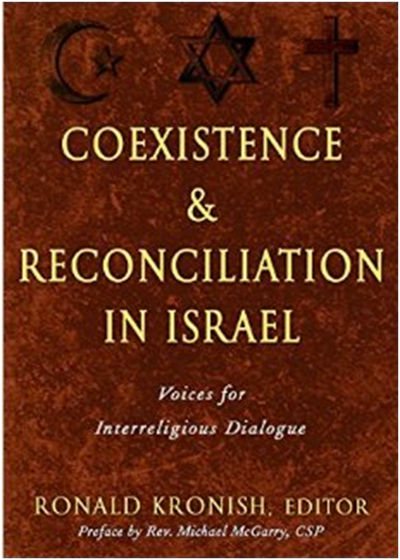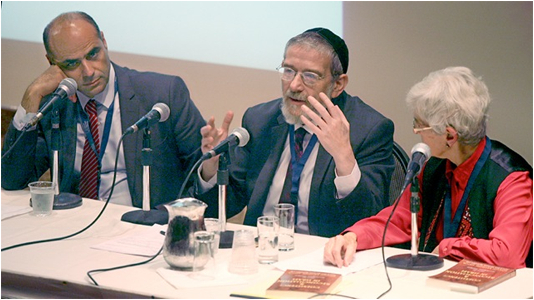On the afternoon of June 14th, 2015, the Konrad Adenauer Conference Center hosted a lively and thought-provoking launch of a book of essays Coexistence and Reconciliation in Israel: Voices for Interreligious Dialogue, which included a panel discussion of renowned religious leaders from the Christian, Jewish and Muslim faiths.

After opening statements by Sister Maureen Cusick and Eva Keeren, the representative from the Konrad Adenauer Stiftung Israel Office, Rabbi Arik Ascherman, the President and Senior Rabbi for ‘Rabbis for Human Rights’ spoke about how important it is for religious leaders to speak and act together to tackle the issues that the current Israeli government will not. Following this, he introduced Rabbi Dr. Ron Kronish, editor of Coexistence and Reconciliation in Israel.
Reason in the midst of irrationality, fear and despair
Rabbi Kronish spoke of his gratitude towards those who contributed to the book, and he explained that he hoped it would provide a voice of reason in an environment of irrationality, fear and despair. He described his work as the out-going director of the Interreligious Coordinating Council in Israel (ICCI), and how the programs run by the ICCI aim to promote peaceful coexistence.
Rabbi Kronish then introduced the panel that would lead a discussion about the role of religion and religious leaders in paving a way to peace through dialogue: Professor Sister Maureena Fritz, a Sister of Sion and co-founder and Chair of the Bat Kol Institute; Rabbi Michael Melchior, co-founder and chairman of the Mosaica Center for Religious Conflict Transformation in the Middle East and former member of the Knesset; and Kadi Dr. Iyad Zahalka, Muslim Judge of the Jerusalem Sharia Court of the State of Israel. The discussion was divided into three sections, each beginning with a question.

(r – l) Dr. Zahalka, Rabbi Melchior and Sister Fritz (Photo-Patricia Cordell)
Questions about messages, challenges and highlights
The first question asked was about the main message that each panellist wished to convey to the audience. Sister Fritz’ focused on the importance of education and Christian to non-Christian dialogue as she asked, how can we know ourselves without knowing the other? Rabbi Melchior spoke about changing the perception of religion as the obstacle to peace to being the vehicle of peace. Dr. Zahalka believes that inter-religious dialogue should be everyone’s method of moving towards peace, through knowing, acknowledging and accepting the ‘other’, and knowing what can be sacrificed in order to achieve this peace.
The second question posed by Rabbi Kronish was about the main obstacles or challenges to peace that each panel member has faced. For Sister Fritz’, the main challenge was the constant demonization of the ‘other’ – she spoke against the language of the media and radicals, and about the need for humility in ending the superiority complex surrounding which religion “has the truth”. Rabbi Melchior proposed that the real problems lie inside religion itself, as religious teachings convince believers that the ‘other’ does not want peace, and that peace is in fact a leftist agenda, a political stance that only 9% of Israelis identity with. He concluded that the conflict is in fact a struggle between religious identity and peace, and “this is our tragedy”. Dr Zahalka spoke of the central but negative impact of the relationship between religions, whose hostilities prevent understanding and acceptance. He lamented that although all religions are committed to benefitting society and fighting evil, they are not united in these causes.
To end on a positive note, Rabbi Kronish’s final question was about each participant’s highlight so far in relation to the peace process. Sister Fritz reflected on how many people she has met and engaged with in her time in Israel/Palestine, and to conclude she quoted Martin Buber, “all real living is meeting”. Rabbi Melchior recounted a meeting with a prominent Islamic leader (whom he did not name), who believed that only a hudna (temporary truce) was viable. However, through dialogue and discussion with the Rabbi, the leader changed his position and declared that Allah’s dignity must be upheld through salaam (peace) and a two-state solution. The success of interreligious dialogue in sparking real change in perspective gave Rabbi Melchior great hope for the future. Finally, Dr Zahalka spoke about the writing of his book Sharia Law in Modern Times based on his doctoral thesis. He explained that all religions teach mercy on humanity, but that there is a need to draw attention away from radical views and to reduce the gap between religions.
Rabbi Kronish was delighted with the fact that the panelists all agreed and adhered to the rules and timeframe of the discussion, and were the best-behaved panel he had mediated!

Part of the overflow interfaith audience at a lighter moment (Photo Patricia Cordell)
The closing speakers were Rabbi Levi Weiman-Kelman from Congregation Kol Haneshama in Jerusalem, and Rabbi Yonatan Shefa, the incoming Director of ICCI. Rabbi Weiman-Kelman remarked that in order to achieve peace, one must be daring. He concluded with a poignant remark that it is important to acknowledge the mistakes of the past in order to move forward.
Peace through interreligious interaction, engagement and dialogue
The evening’s final words came from Rabbi Shefa, who reflected on the past two decades of the peace process. He spoke of the optimism and hope of the 1990s, the violence and separation of the 2000s, and the question of whether peace is a practical possibility today. He stressed the need to feel that peace is possible in order to vote for, act on, and actually move towards peace. He explained that the ICCI will be developing initiatives through social media and ‘meta dialogue’ to stimulate public discussion and debate for the future.
The evening concluded on an optimistic and inspiring note as Rabbi Shefa proposed that Israelis and Palestinians must reclaim the idea of peace from politicians and cultivate an environment where peace can prosper, and will be achieved through interreligious interaction, engagement and dialogue.
